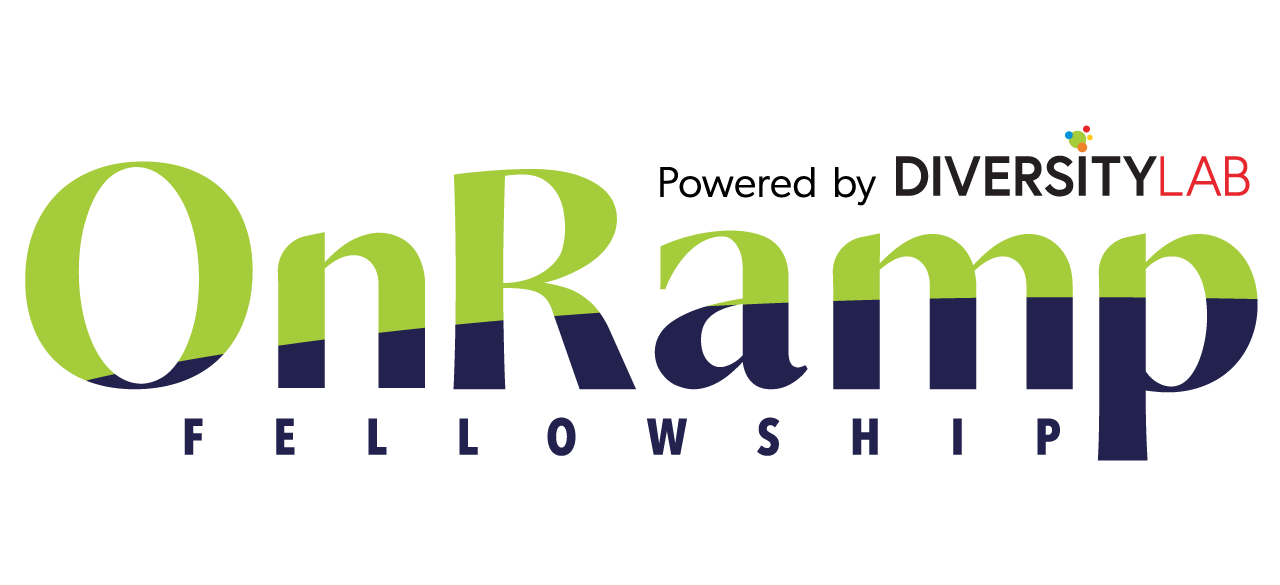As Carol Fishman Cohen writes in Harvard Business Review:
Please contact Sajani Granquist at sajani@diversitylab.com to learn more. Sajani and the OnRamp team will be happy to talk with you to share more details about how to get involved with OnRamp.
Each Fellowship applicant is rigorously screened to assess their experience, skill set, and desire to return to and advance in a legal organization. As part of the screening process, each applicant is expected to:
Once the initial interview process is complete, comprehensive candidate profiles—incorporating assessment results and other application details—are shared with the employers the candidate has expressed interest in. After reviewing the profiles, organizations are encouraged to directly interview their top candidates to identify the most qualified individual for a Fellowship offer. Hiring will follow a structured timeline for job postings, interviews, and offer decisions. Fellow cohorts will begin at several designated intervals throughout the year.
Note that the OnRamp Fellowship does not require, and is not intended to require, an employer to extend a preference based on gender or other protected demographic traits. Each organization is expected to administer the program consistent with applicable law, including Title VII, and should seek independent legal counsel if uncertain how to do so.
Yes. In exchange for an annual stipend (see typical ranges below) and benefits, which are paid by the organization, the Fellow works on complex projects and receives training, coaching, and ongoing feedback from the Fellowship and a designated advisor in their organization as well as from the Fellowship team.
Full-time Fellows are generally paid a stipend in the range of $115,000 – $225,000 for the year (depending upon the size of the organization and other factors), plus benefits.
Please note: It is the organization’s responsibility to perform any pre-hire and post-hire new employee protocols, such as background and conflicts checks.
OnRamp offers support from a variety of resources, including:
To ensure a successful Fellowship experience, the organization, the Fellow, and the Fellowship Directors share responsibility for the program as outlined below.
The organization will: (1) designate an advisor to serve as the main contact for work allocation and feedback, including scheduling feedback check-ins with the Fellow during the year; and (2) provide the Fellow with a stipend and access to any internal training or career development activities during the one-year program.
The Fellow will: (1) monitor their own workload and track their progress towards gaining the success traits needed to add value to the organization; and (2) check in regularly with their advisor and any other team members to obtain feedback on their work and skill development.
The Fellowship Directors will: (1) check in at least quarterly with the Fellow and the advisor to obtain feedback on the Fellow’s performance and potential advancement possibilities; and (2) ensure that the Fellow has access to training resources, an experienced career counselor, and other external opportunities to develop skills and contacts.
Ideally, Fellows who do excellent work will conclude the Fellowship with a current professional reference that can be leveraged as they pursue their next endeavors. Additionally, if a relevant position is available, the organization can offer a longer-term role.
The end result of the Fellowship is a diverse high performer who returns to the workforce with upgraded skills and experience, additional contacts, an excellent reference, and a renewed ambition to service clients. In turn, the legal profession and individual organizations benefit by engaging with a previously untapped pool of high-performing talent and, hopefully, increased gender diversity in the mid to senior-level leadership ranks.
Although there are no set guidelines regarding the types of projects to which the Fellow can be assigned, there is a requirement that the projects support skill development in the areas that are necessary for advancement in the organization, such as business acumen and decision-making. The Fellow works on complex projects and receives ongoing feedback from a designated advisor. Projects range from independent research to direct internal or external client interaction throughout the one-year program.
If you are a law firm or legal department interested in gaining access to a group of high-performing lawyers and advancing inclusivity in the workplace, please contact Sajani Granquist at sajani@diversitylab.com

Copyright © 2023 OnRamp Fellowship, Diversity Lab LLC. All Rights Reserved. Designated trademarks and brands are the property of their respective owners.
Privacy Policy Accessibility Statement
Copyright © 2023 OnRamp Fellowship, Diversity Lab LLC. All Rights Reserved. Designated trademarks and brands are the property of their respective owners.
Privacy Policy Accessibility Statement